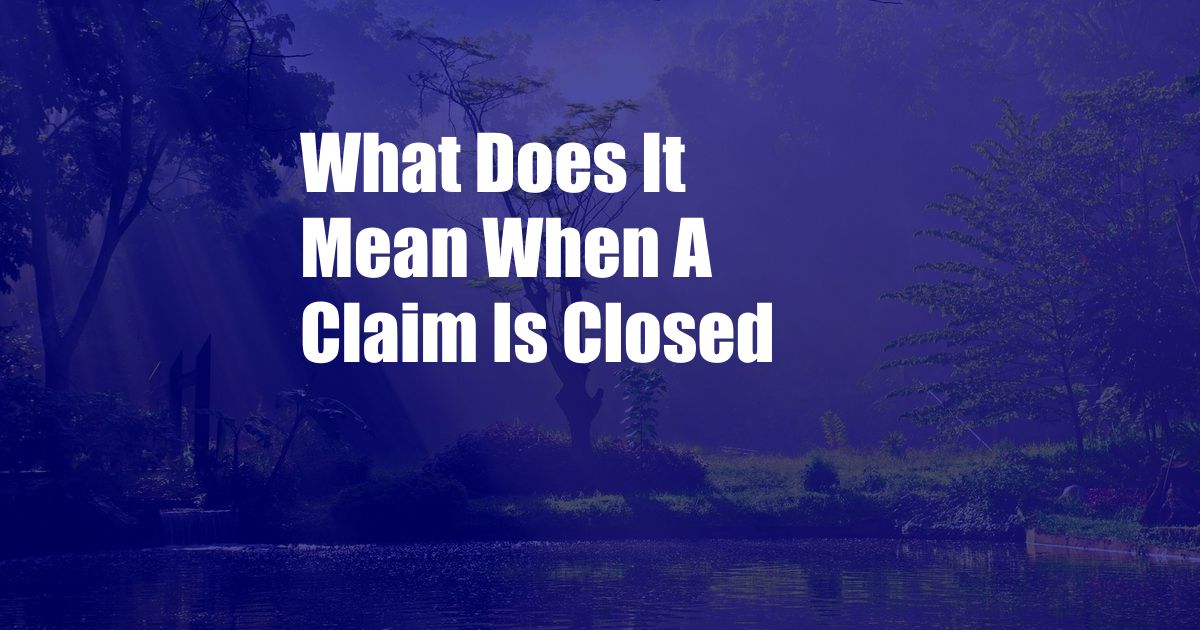
What Does It Mean When a Claim Is Closed?
Imagine yourself driving home from work on a rainy evening when suddenly, a reckless driver runs a red light and T-bones your car. The impact is jarring, and you’re left shaken and disoriented. In the aftermath of the accident, you file a claim with your insurance company, hoping for a speedy and fair resolution.
As you navigate the claims process, you may encounter various terms and procedures, including the concept of “claim closure.” What exactly does it mean when a claim is closed, and what are the implications for you as the policyholder?
What Is Claim Closure?
Claim closure marks the final stage in the insurance claims process. It signifies that the insurance company has completed their investigation, determined the extent of coverage, and issued a settlement or denial.
When a claim is closed, the insurance company considers the matter resolved and no longer has any outstanding obligations to the policyholder regarding that particular claim. The policyholder, in turn, is expected to accept the settlement or denial and cease pursuing further action against the insurance company.
Understanding the Claim Closure Process
- Investigation: The insurance company investigates the claim, gathers evidence, and determines the cause and extent of the damages.
- Coverage Determination: The insurance company reviews the policy and determines the coverage that applies to the claim.
- Settlement Offer: Based on the investigation and coverage determination, the insurance company offers a settlement amount to the policyholder.
- Negotiation (Optional): The policyholder may negotiate with the insurance company to increase the settlement amount if they believe it is inadequate.
- Settlement Acceptance or Denial: The policyholder either accepts the settlement or denies it and pursues further action.
- Claim Closure: If the policyholder accepts the settlement, the claim is closed, and the insurance company issues payment. If the policyholder denies the settlement, they may file a lawsuit or pursue other legal options.
Tips for Policyholders During Claim Closure
To ensure a smooth and satisfactory claim closure process, it’s crucial for policyholders to:
- Document Everything: Keep a record of all communication with the insurance company, including phone calls, emails, and letters.
- Understand Your Policy: Review your insurance policy thoroughly to understand the coverage and limitations that apply to your claim.
- Be Patient and Persistent: Claim closure can take time. Be patient, but don’t hesitate to follow up with the insurance company regularly.
- Consider Independent Advice: If you’re not satisfied with the settlement offer or have any concerns, consider seeking advice from an attorney or insurance expert.
FAQs on Claim Closure
- Q: How long does it take to close a claim?
A: The time it takes to close a claim varies depending on the complexity of the accident, the amount of damage, and the insurance company’s processes.
- Q: What happens if I disagree with the settlement offer?
A: You have the right to negotiate with the insurance company or pursue legal action if you believe the settlement is inadequate.
- Q: Can I reopen a closed claim?
A: In most cases, no. Once a claim is closed, it’s generally considered final and cannot be reopened. However, there may be exceptions, such as if you discover new evidence or believe the settlement was fraudulent.
Conclusion
Understanding what it means when a claim is closed is crucial for policyholders to navigate the insurance claims process and settle their claims fairly. By following the tips and advice provided in this article, you can increase your chances of a successful claim closure that meets your expectations.
Are you interested in learning more about insurance claims and the nuances of claim closure? Share your thoughts and questions in the comments section below.